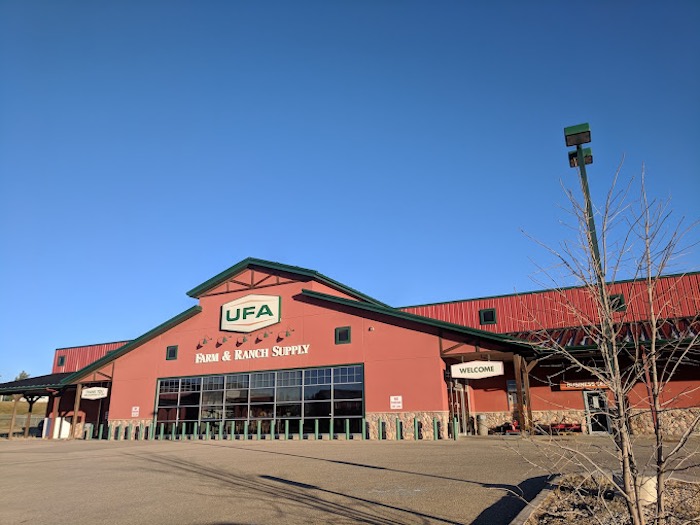Agriculture
UFA announces Farm & Ranch Supply story in Gasoline Alley along with historic $28 million patronage membership dividend

UFA Announces $28 Million Patronage Dividend
UFA shared big news today announcing a historic patronage dividend of $28 million back to its membership and fully opening two new locations in Saskatchewan!
One of the primary benefits to being a co-operative member is patronage, and this year’s patronage dividend is truly significant. We have expanded our patronage program to reward our membership by paying on more categories of purchases. More products our members use daily on their farm, ranch, or for their business now earn them patronage rewards. We are proud to grow and deliver patronage consistently. At UFA, members can count on their co-operative and on patronage.
Scott Bolton, President and CEO, UFA
We believe good business is rooted in investing in good relationships and consistently rewarding our membership with a growing patronage dividend demonstrates our commitment. We take great pride in our patronage program. As owners of UFA, our success is truly our members’ reward.
Kevin Hoppins, Board Chair, UFA.
In addition to the $28 million patronage announcement, UFA shared that it officially opened its doors in Weyburn and Yorkton. These sites are part of the expansion of UFA’s petroleum business into key markets in central and eastern Saskatchewan.
We believe in the value of giving our members and customers choice. People living in or nearby these communities now have another option of where to spend their hard-earned dollars. Expanding our network is part of a concerted strategy to grow from an Alberta-focused fuel and agribusiness co-operative to a western-Canadian leader.
Scott Bolton, President and CEO, UFA
Meet the Weyburn and Yorkton Petroleum Agents
Features of the new UFA petroleum locations:
-
Gasoline and Clear and Dyed Diesel
-
DEF at the pump and UFA, Shell and Chevron branded lubricant products
-
High-speed pumps and wide lanes
-
State-of-the-art warehouse and office
-
Dieselex® Gold. UFA is pleased to offer its exclusive diesel offering to Saskatchewan. This top-tier premium product is engineered to enhance fuel efficiency, reduce maintenance, and increase power.

UFA is the exclusive distributor of Dieselex® Gold
UFA also announced Dunmore and Saskatoon as the next locations in UFA’s expansion strategy
UFA is committed to investing in our network and bringing our unique product selection to new locations throughout Western Canada. The regions around Dunmore, Alberta, and Weyburn, Yorkton and Saskatoon, Saskatchewan, and the other markets selected for additional locations are key marketsin Western Canada’s agribusiness and industrial economy. The expansion project will provide significant investment throughout Western Canada and UFA looks forward to serving the local communities where the new petroleum sites will be located. Along with looking at new investment opportunities, we believe it is essential to give back to rural communities we serve, ensuring they thrive well into the future.
Don Smith, Vice President, Petroleum and Innovation, UFA.

Weyburn UFA Petroleum Agency
Agriculture
Carney’s nation-building plan forgets food

This article supplied by Troy Media.
Canada’s agri-food sector powers $90 billion in exports and one in nine jobs, yet it’s missing from the fed’s flagship infrastructure agenda
Prime Minister Mark Carney’s “nation-building” strategy may boast big wins for energy and infrastructure, but it sidelines one of Canada’s greatest economic assets: food.
His first five flagship projects—the LNG terminal in Kitimat, a small modular nuclear reactor in Darlington, the $1-billion Contrecoeur container terminal east of Montreal and mineral developments in B.C. and Saskatchewan—send a message that Ottawa is ready to build. But for all their ambition, they overlook the sector that feeds the country, powers $90 billion in exports and supports one in nine jobs.
Canada is one of the world’s great breadbaskets—reliable, safe and absurdly productive. The agrifood sector isn’t just farms and tractors; it’s one of the most advanced, innovative ecosystems we’ve got. And yet, among Carney’s first round of “nation-building” moonshots, food didn’t even get a seat at the table.
Sure, the expanded port in Montreal will help grain and processed food shipments. And yes, stable nuclear power might one day shave energy bills for processors and greenhouse growers. But these are trickle-down perks—not the kind of direct investment the sector actually needs. Food deserves its own spotlight.
This oversight isn’t just symbolic—it exposes real pressure points that threaten the entire system. Take Western Canada’s beef-packing bottleneck, for example: a few mega-facilities dominate the sector, so when one gets gummed up by a strike or shutdown, it sends shockwaves through the entire supply chain. Farmers are left holding the bag—and consumers feel the hit. Expanding and decentralizing capacity would help, but that’s just scratching the surface.
If Carney wants to prove Canada can be a food power as much as an energy one, we need projects with the same heft and urgency as those just announced. To match the ambition of Carney’s energy and infrastructure plans, here are five food-sector nation-builders that would move the dial:
1. The Prairie Gateway Grain and Pulse Terminal—a rail-linked export hub in Saskatchewan or Manitoba—would get lentils, peas, canola and wheat to global
markets fast. Think Contrecoeur, but for the Prairies.
2. Protein Supercluster 2.0 would string together state-of-the-art processing facilities to transform raw commodities into premium plant proteins, canola oil and biofuels. A second-generation government-backed innovation corridor, it would help Canada move from raw exports to value-added, export-ready, job-creating production.
3. A National Plant and Animal Science Campus, inspired by Wageningen University in the Netherlands—a world leader in agricultural research—would centralize the kind of next-gen crop science, livestock genomics and climate-resilient breeding Canada will need to compete in the decades ahead. Call it moonshot science; we’ve been staring at the ground too long.
4. Northern Food Sovereignty Corridors, featuring investments in greenhouses, vertical farms and logistics, would reduce reliance on overpriced imports and bring fresh food, and economic independence, to northern and Indigenous communities. It would also move reconciliation from speech to action.
5. A Digital Food Traceability Network would use blockchain and AI to track food from seed to supper, slashing waste, boosting consumer confidence and giving our exports a transparency edge in an increasingly picky global market.
Carney’s five projects are a solid start. They prove Canada can think big. But a real strategy needs to feed people as well as power them. Agriculture can’t remain the forgotten cousin in economic planning.
The point isn’t to downplay the importance of energy or mining. Mines and reactors may fuel prosperity but it’s food—and the infrastructure, science and innovation behind it—that will secure it. Canada’s real strength lies not just under the ground but in the fields, labs and refrigerated supply chains that keep our plates full and our trading partners coming back for seconds.
Dr. Sylvain Charlebois is a Canadian professor and researcher in food distribution and policy. He is senior director of the Agri-Food Analytics Lab at Dalhousie University and co-host of The Food Professor Podcast. He is frequently cited in the media for his insights on food prices, agricultural trends, and the global food supply chain.
Troy Media empowers Canadian community news outlets by providing independent, insightful analysis and commentary. Our mission is to support local media in helping Canadians stay informed and engaged by delivering reliable content that strengthens community connections and deepens understanding across the country.
Agriculture
“We Made it”: Healthy Ostriches Still Alive in Canada

Looks like we made it. For another weekend at least. Until sanity settles down into the head into the head of the federal government that remains fixated on the killing of 399 healthy ostriches. As the clock wound down today, an announcement from the farm proclaimed, “We made it today,” calling it another “miracle Friday.”
WATCH TODAY’S Miracle Friday Announcement
Earlier in the day, Rebel News’ Drea Humphrey reported, “There’s apparently a SWAT team up the road, I hope that doesn’t mean they’ve gotten bad news,” wondering “if the police were preparing to aid the CFIA in the cull.”
Dacey Media reported that the farm said that “Ostrich Hunters” were also spotted at Universal Ostrich Farms according to Katie Pasitney The “kill pen” is fully set up and CFIA have been luring ostriches into it.
But as of 5:30 ET, it seems the farm and the ostriches may have escaped to live another day as the Supreme Court of Canada (SCC) did not hand down a decision to grant a further leave to the farm to prepare its case, or dismiss the case, allowing the Canadian Food Inspection Agency (CFIA) to proceed with their “cull” to kill 399 healthy ostriches.
The palpable, raw government over-reach that includes over 100 Royal Canadian Mounted Police (RCMP) that have occupied the farm highlights the mismanagement of the CFIA and may be one of the reasons that the SCC has hesitated in making a decision before the weekend.
Call to Dismantle the CFIA
On today’s Stand on Guard interview Katie Pastiney, spokeswoman for the Universal Ostrich Farms in British Columbia called for the dismantlement of the Canadian Food Inspection Agency. She says that the CFIA:
“Needs to be dismantled and we need to rebuild this organization back up from the ground up and we need to have a new vision.
“We need to have a new mission and a brand-new face for Canadians that will give us hope that we will be protected not attacked.”
“The Canadian Food Inspection Agency continues to overuse their authority, overuse their excessive freedom that they’ve been given, and they have zero accountability for their actions.”
The farm has been embroiled in a dispute with the federal government and its CFIA agency for close to a year. The agency claims the flock of ostriches has the avian flu, but it refuses to test the farmers’ birds, even though they have been healthy for 258 days. At the same time the CFIA will not let the farmers pay for the tests themselves, saying they will charge them $250,000 per ostrich and put them in jail for 6 months.
The federal agency and the RCMP have seized and occupied the farm since September 22, 2025. they have conducted a campaign of harassment of the farm family and their flock of ostriches that included: arresting the farmers when they were told to go feed their birds; using lights and heavy equipment at night’; sending drones to chase the birds that resulted in pushing one bird over the fence so it hurt its leg, not treating the animals properly; and not feeding the ostriches full rations of food and water and not treating the birds the CFIA injured. These activities have continued as the CFIA continues to construct a “kill box” of hay bales that have been on fire four times while under the CFIA’s supervision and occupation.
Running Out of Time
In a stunning report on X October 2nd, however, before the Supreme Court of Canada had made decision, the CFIA has daily continued to move forward to kill the ostriches ignoring the SCC legal “stay.”
Karen Esperson, Pasitney’s mother yesterday reported on X:
“We need to put CFIA in check.
“This organization feels they are greater than the Supreme Court of Canada. they are still positioning the birds and putting them in the position to be killed immediately. They are assuming they know the outcome of the Supreme Court oof Canada. Do they think they are better than the Supreme court? That they are going to for sure win?
“The Supreme Court has not decided.
“What is happening?
“We are on a stay order and yet I just got a call that they have a whole bunch of birds herded in a little circle in the kill pen.
“Waiting. This is animal cruelty.”
Efforts to Save the Ostriches
More and more Members of Parliament have been speaking up on behalf of the farmers including the local provincial representative, the local Member of Parliament Scott Anderson, who visited the farm trying to talk to the CFIA and also the Official Leader of the Opposition Pierre Poilievre spek out yesterday.
A second press conference hosted by John Catsimatidis, a New York radio host, billionaire and friend of Donald Trump and Dr. Oz, was also held yesterday. The USA Trump administration representatives including Robert F. Kennedy say they want to either pay for the ostrich testing or help re-locate them to the United States for further research opportunities. This outreach has been ignored.
CFIA Has Staff Enough to Kill but NOT Enough Staff to Test?
In my interview today with Pastiney she explained how the CFIA did originally give their ostrich farm an exemption that was later rescinded because the CFIA told them they were “understaffed and we’re not able to perform these tests.”
“There was an exemption package that was given to us on January 2nd. We have an email from Canadian Food Inspection Agency stating that we qualify for special rare genetics within our herd and that we could be exempt.
“Now when we followed through with that because we needed to test them just to show their DNA and their genetics and show their lineage that between January 2nd and January 10th something happened.
“Now we didn’t qualify we lost that right.
“And on January 10th they said sorry you don’t qualify for special rare genetics because we are understaffed and we’re not able to perform these tests.”
Why does the CFIA have staff to occupy the farm for weeks and to kill 399 ostriches as well as requisition the Royal Canadian Mounted Police (RCMP) over 40 cars and reportedly more than 100 police on the farm since September 22nd, and not have the money to test the birds for the exemption?
How much has this debacle and exercise into Carney Government overreach been charged to Canadian taxpayers?
More than the tests to see if the ostriches are healthy or if they qualify for the exemption?
Other Farmers May Join in Efforts to Disband the CFIA
Pastiney says:
“I just did an interview with a farmer that this very same thing happened to them and it was based off a suspicion of tuberculosis outbreak on their farm.
“They [the farmers] had over 600 head of cattle, they had sheep, they had goats, they had pig or pigs, they had chickens.
“They [the CFIA] came in based off suspicion and off their own negligence they killed everything this beautiful older farm had to find out in the end that they tested after everything was dead and there was no tuberculosis.”
“I asked her a very important question, and I said could you trust this organization again? And she said, absolutely not.
“So, it became very clear to me after this about talking to two or three farmers that the Canadian Food Inspection Agency needs to be dismantled.”
“It is an organization that has lost the trust of Canadians.
CONCLUSION
WATCH Katie is Fighting For Everyone’s Freedom | Stand on Guard
www.kraydensrightnews.com is a reader-supported publication.
To receive new posts and support my work, consider becoming a free or paid subscriber.
-

 Alberta2 days ago
Alberta2 days agoClick here to help choose Alberta’s new licence plate design
-

 National2 days ago
National2 days agoDemocracy Watch Renews Push for Independent Prosecutor in SNC-Lavalin Case
-

 International1 day ago
International1 day agoHamas will disarm or die
-

 illegal immigration1 day ago
illegal immigration1 day agoLos Angeles declares a state of emergency over ICE deportations
-

 International2 days ago
International2 days agoDaughter convinces healthy father to die in double assisted suicide with mother
-

 International2 days ago
International2 days agoUS Warns Hamas To Halt Executions
-

 Business1 day ago
Business1 day ago‘Taxation Without Representation’: Trump Admin Battles UN Over Global Carbon Tax
-

 Indigenous1 day ago
Indigenous1 day agoConstitutional lawyer calls for ‘false’ claims to end in Canadian residential schools burials



















